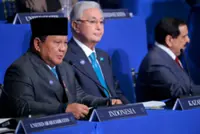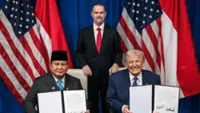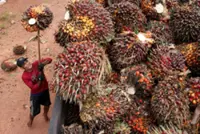JAKARTA: Former president Joko “Jokowi” Widodo’s appearance during his recent birthday celebration has sparked renewed speculation about his health, and whether it played a role in his decision not to enter the race for the Indonesian Solidarity Party (PSI) chairmanship.
Jokowi marked his 64th birthday on Saturday (June 21) at his private residence in Sumber Village, Banjarsari District, Surakarta, Central Java.
The celebration drew hundreds of residents, who arrived in the morning with traditional food and local delicacies as tokens of affection for the popular former leader.
However, public attention quickly shifted to Jokowi’s physical condition.
Visible swelling and dark spots on his face, coupled with the brief duration of his visit and his decision not to take photos with guests as he typically does, led many to question whether he was unwell.
His aide, Comr. Syarif Fitriansyah, confirmed that Jokowi was recovering from an allergic skin reaction that had caused facial inflammation.
“Visually, we can see there are differences in his appearance, but overall his physical health is fine,” Syarif said on Sunday, Kompas.com reported, assuring that Jokowi’s condition has improved in recent days.
Concerns over Jokowi’s health have simmered for months, fueled by viral clips from recent doorstop interviews in which he appears visibly fatigued and less energetic than usual.
Syarif explained previously that Jokowi had an allergic reaction after his trip to the Vatican last April, when he attended Pope Francis' funeral on behalf of President Prabowo Subianto.
“Perhaps the shift in the weather [triggered the condition]. Once he returned and adjusted to the local climate, the symptoms began to show,” Syarif said on June 5, adding that a medical team had treated Jokowi at home.
Many have speculated that Jokowi may be suffering from Stevens-Johnson Syndrome (SJS), a rare but potentially life-threatening skin condition.
According to the United States’ National Library of Medicine, the syndrome affects two to seven people per million annually and can affect anyone with a genetic predisposition, although studies show it is more common in older adults and women.
It is characterised by severe skin reactions that can lead to extensive tissue damage.
Syarif denied that Jokowi’s condition was related to SJS or any autoimmune disease, emphasising that he had not experienced typical symptoms such as fever or itching.
The renewed attention to Jokowi’s health has come alongside confirmation that he will not run in the upcoming PSI leadership election, despite earlier signs of interest, fueling speculation that his health may have influenced the decision.
His youngest son, Kaesang Pangarep, who currently serves as PSI chairman, confirmed the news on Saturday, saying it followed a week-long discussion with his father.
“It wouldn’t be right for a son and father to compete against each other,” Kaesang told Antara after officially registering to seek another term as party chairman.
Jokowi, who is not a member of any political party after being expelled from the Indonesian Democratic Party of Struggle (PDI-P), has indicated in recent months that he was interested in trying his luck at PSI’s leadership race on July 19.
The self-proclaimed “youth party”, which is a staunch supporter of Jokowi, has also openly welcomed all potential candidates to register, including national figures like the former two-term president. - The Jakarta Post/ANN





